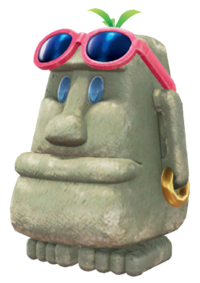Moe-Eye
| Moe-Eye | |||
|---|---|---|---|

| |||
| First appearance | Super Mario Odyssey (2017) | ||
| |||
Moe-Eyes are a species from Super Mario Odyssey that can be captured with Cappy. They are based on their namesake, the moai statue heads, and have a pair of feet, earrings and sunglasses, and a tuft of green hair.
Super Mario OdysseyEdit
In Super Mario Odyssey, Moe-Eyes are found in the Moe-Eye Habitat, the Transparent Maze of the Sand Kingdom, and the Underground Moon Caverns in the Moon Kingdom. They are always seen looking at Mario, briefly taking their eyes off him for their idle animation. They do not move by default. If Mario comes closer, Moe-Eye panic. They shift their sunglasses upward, and try to run away. They are unable to walk off most ledges. When they are unable to move forward, Moe-Eye switch to moving parallel to the ledge or wall. Moe-Eye are fully immune to cacti, and kick away any of the smaller variation they touch. The panicking state resets quickly, but if Mario is still in their radius it will restart instantly.
When captured by Mario, the player can put on or take off the sunglasses by pressing or . While the sunglasses are on, the player is able to see Transparent Platforms, invisible coins, Hidden Blocks. They can also see a pillar of light from the locations of underground Power Moons, even those that do not have a corresponding glowing spot. (As with other light pillars in Super Mario Odyssey, the light is less intense if the player is close to the source.) Moe-Eye walk much slower than normal while wearing the sunglasses. (The player can capture a Moe-Eye while their sunglasses are still on, but Moe-Eye take their glasses off just after being captured, so the game functionally defaults to having glasses off.)
Moe-Eyes are unable to jump, with the respective buttons also using their sunglasses. In addition, Moe-Eyes plummet directly off the edges of platforms with no ability to change trajectory. As such, Mario has to use elevators to access higher platforms, or in some cases has to first use a Moe-Eye to see invisible platforms that must be jumped to then navigate after releasing the Moe-Eye. Mario can still use the cacti immunity.
A captured Moe-Eye can be heard faintly humming the first few notes of the "Ground Theme" or the "Ending" theme from Super Mario Bros., the Super Mario World "Ending" theme, "Gusty Garden Galaxy" from Super Mario Galaxy, or another unknown theme[1] while the sunglasses are on.
Despite being harmless, they will return with the same purple effect that signifies a respawning enemy after they are defeated by poison, lava, or pits. Additionally, NPCs not frightened by Moe-Eyes but are frightened by captured Moe-Eyes. This can be shown if Mario flies near their habitat as Glydon, who will tell the Moe-Eyes to stay away if Mario captures one.[2]
Concept and creationEdit
The design of the Moe-Eye used peculiar textures that would make them easily distinguishable from the ruins of Tostarena.[3] Great care was poured into getting an appropriate appearance of the forehead, although this is typically not visible during the game.[3]
ProfilesEdit
- Website bios
GalleryEdit
Additional namesEdit
Internal namesEdit
| Game | File | Name | Meaning
|
|---|---|---|---|
| Super Mario Odyssey | ObjectData/Megane.szs | Megane | Romanization of「眼鏡」(spectacles), referring to its eyewear |
Names in other languagesEdit
| Language | Name | Meaning | Notes |
|---|---|---|---|
| Japanese | ミルゾウ[?] Miruzō |
Portmanteau of「見る」(miru, to see) and「像」(zō, statue) | |
| Chinese (simplified) | 观像[?] Guān xiàng |
Literally "looking statue" | |
| Chinese (traditional) | 看看像[?] Kàn kàn xiàng |
Literally "looking statue" | |
| Dutch | Moe-Eye[?] | - | |
| French | Ma'tuvu[6] | Pun on "m'as-tu vu" (French phrase meaning "did you see me?") | |
| German | Röntgolith[?] | From "röntgen" (x-ray) and "-lith" (a common suffix for rocks) | |
| Italian | Spionelito[?] | From "spione" (a colloquialism of spy) and "-lito" (the common suffix for rocks) | |
| Korean | 볼테다[?] Bolteda |
Literally means "dare to see" | |
| Russian | Глазолит[?] Glazolit |
From "глаз" (glaz, eye) and "-лит" (-lit, common suffix for rocks) | |
| Spanish (NOA) | Mo-guay[?] | Moe-cool | |
| Spanish (NOE) | Mo-Guay[?] | Moe-Cool |
ReferencesEdit
- ^ Thomas Game Docs (May 8, 2022). Nintendo’s music is FULL of hidden secrets. YouTube. Retrieved May 23, 2022.
- ^ SenderwalkTest. (November 28, 2020). SenderwalkTest on Twitter: "The Super Mario Wiki needed some sourcing. This video should do the trick. #SuperMarioOdyssey #NintendoSwitch". Twitter. Retrieved November 28, 2020.
- ^ a b Post about the concept art of a Moe-Eye from the Japanese Super Mario Odyssey official Twitter account. Retrieved January 23, 2018.
- ^ https://www.nintendo.co.jp/switch/aaaca/action/index.html
- ^ https://www.nintendo.co.uk/Games/Nintendo-Switch-games/Super-Mario-Odyssey-1173332.html#Meet_Cappy
- ^ Official French Super Mario Twitter
